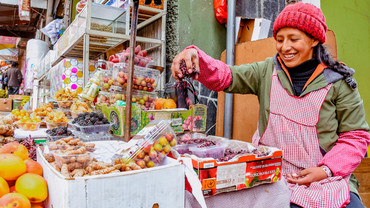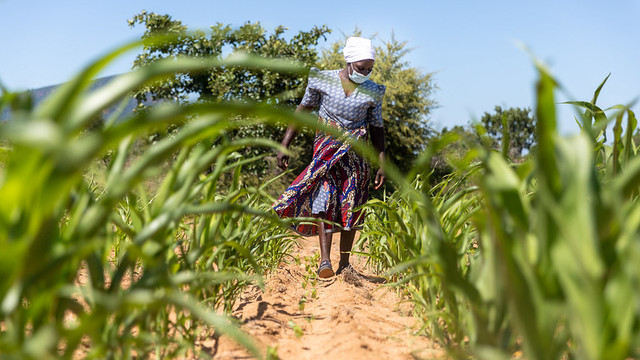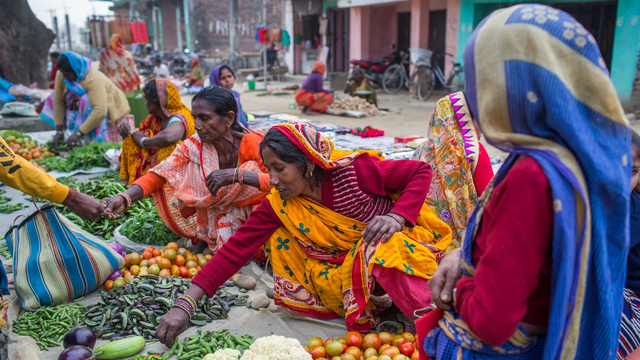Harnessing the potential of Zambia’s informal food sector
A new report supported by IIED and Hivos explores how harnessing the potential that lies within the informal food sector and integrating it into urban policy planning could help Zambia meet SDG2 ‘zero hunger’ and improve the diets of people across all income groups.



Women selling fruit and vegetables at Lusaka City Market (Photo: Salim Dawood/Hivos)
Like many developing countries, Zambia’s informal food market is growing, driven largely by rapid urbanisation. Selling a variety of products at relatively low prices, informal food vendors offer access to healthy, nutritious and affordable food. With low-income households purchasing more than 90% of their food in informal outlets, they play a crucial role in feeding Zambia’s urban poor.
The government’s approach
But given the nature of informal markets, managing them has been a complex task for the government. Despite providing food security for the growing urban population, the authorities regard informal markets as unhygienic food sources that contribute to health and safety problems and offer low-nutritional food.
In early 2018, the government attributed Zambia’s cholera epidemic to street vending and poor sanitation in marketplaces, razing makeshift stalls and introducing more stringent laws. These have since been relaxed and street vendors are back on two streets in the capital’s central business district.
Although the government acknowledges the importance of the sector, urban food planning and policy discussions take little account of informal markets. The new report, Informal food markets in Zambia, shows that where they do consider them, there is a strong bias towards formalisation.
The country’s main national planning documents discuss the importance of broad-based economic growth, of ensuring that economic growth benefits all and of accelerating development efforts while leaving no one behind. But they do not mention the informal sector or how to integrate it into the economy.
The Ministry of Agriculture, the Citizens’ Economic Empowerment Commission and the National Pensions Scheme Authority should all respond to the needs of informal sector players. But instead they target formalised groups such as co-operatives, overlooking the challenges faced by informal vendors such as low education levels and limited access to social security services.
Ultimately, the government’s approach to engaging with the informal sector is attempting to eradicate it through formalisation.
Taking a different view
But formalisation is neither easy nor straightforward. On the contrary, it is something that needs to be done gradually over time.
In the meantime, there are several opportunities for improving the daily life of those who work in, and benefit from, the informal food market. These include upgrading infrastructure, simplifying market levies, increasing access to capital and credit, supporting self-help savings groups and promoting value addition.
And rather than view such opportunities as an expense to improve the lives of a few vendors, the authorities should consider them investments that benefit the millions of people who rely on informal vendors for their food.
Giving the sector a voice
The Sustainable Diets for All programme (SD4ALL) works with local partners in Zambia advocating the inclusion of the informal sector in broader policy discussions. We make change happen in two ways: from the top via policy change and from the bottom by working with people at the grassroots.
SD4ALL partner CUTS (Consumer Unity & Trust Society) International informed high-level policy dialogue in the Zambian parliament on a new food safety bill, strengthening the proposed text so it clearly outlined how the government would engage informal markets. CUTS also works with local authorities to promote sustainable diets in Lusaka, formulating a food policy that acknowledges the informal food market’s role in the urban food system.
At the grassroots level, SD4ALL embraces a citizen agency perspective that challenges the common pattern of expert-driven policies and interventions. Our partners Alliance for Zambian Informal Economy Associations (AZIEA) and CUTS work directly with market actors in Zambia’s two largest cities to better understand their priorities and dispel assumptions associated with the informal sector.
In Kitwe, AZIEA has created a formal relationship between farmers, transporters, traders and the city council to address poor hygiene, safe chemical application and foodstuff pricing issues. In Lusaka, CUTS has brokered a more direct dialogue between the city council and informal food sector actors, enabling local traders to talk about the challenges they face and offer solutions for improvement.
Working with Lusaka City Council, CUTS also trains food vendors in basic nutrition and the importance of diversified diets so they can convey these messages to their peers and customers. These actions complement policy advocacy and help create voices that can demand change beyond the life of the SD4ALL programme.
Towards a new relationship
To date, conversations have tended to focus on policing and clamping down on the informal food economies, mostly ignoring the state’s roles and responsibilities in providing public services that ensure and maintain food safety.
It is time for city authorities to reassess their approach of sidelining the informal sector and focus instead on harnessing the potential that lies within. Finding ways to integrate the informal market into urban policy planning will help Zambia promote ‘zero hunger’ and also seek to ensure that all income groups can eat nutritious food.
- Download 'Informal food markets in Zambia'




